五年级下册三单元单词和句子
五年级下册英语unit3知识点

五年级下册英语unit3知识点五年级下册英语unit3知识点Unit3单词Unit 3January/ˈdʒænjuər/一月February/ˈfebruər/二月March/mɑ:t/三月April/ˈeɪprə/四月May/meɪ/五月June/dʒu:n/六月July/dʒuˈlaɪ/七月August/ˈɔ:gəst/八月September/sepˈtembə(r)/九月October/ɒkˈtəʊbə(r)/十月November/nəʊˈvembə(r)/十一月December/dɪˈsembə(r)/十二月few/fˈju:/不多;很少a few 一些thing/θɪŋ/事情meet/mi:t/集会;开会sports meet运动会Easter/i:stə(r)/复活节trip/trɪp/旅行ear/jɪə(r)/年plant/plɑ:nt/种植contest/'kɒntest/比赛;竞赛the Great Wall长城national/ˈnæʃnəl/国家的National Day 国庆日American/əˈmerɪkən/美国的Thanksgiving/ˌθæŋks'ɡɪvɪŋ/感恩节Christmas/ˈkrɪsməs/圣诞节holiday/ˈhɒlədeɪ/假日;节日game/geɪm/游戏roll/rəʊl/滚动look for寻找chocolate/ˈtʃɒklət/巧克力bunny/ˈbʌni/(用作儿语)兔子RSVP(尤用于请柬)请赐复by/baɪ/在……之前Unit3必考短语常用节假日名称:New Year’s Day元旦(1.1)Tree Planting Day 植树节(3.12)Easter 复活节Ap ril Fool’s Day愚人节(4.1)May Day 劳动节(5.1)Mother’s Day母亲节(每年五月的第二个星期天) Children’s Day 儿童节(6.1)Father’s Day父亲节(每年六月的第三个星期天) Teachers’ Day教师节(9.10)China’s National Day国庆节(10.1)Mid-Autumn Day 中秋节(农历八月十五)Thanks giving Day 感恩节(11月第4个周四)Christmas圣诞节(12.25)summer vacation暑假winter vacation寒假活动名称:sports meet 运动会Easter party 复活节聚会school trip 学校旅行Chinese test 语文测试singing contest歌唱比赛birthday party生日聚会Unit3必考句型1、问答某个活动或节日在几月份的句型及答复。
PEP小学英语五年级下册第三单元单词、句子、语法习题
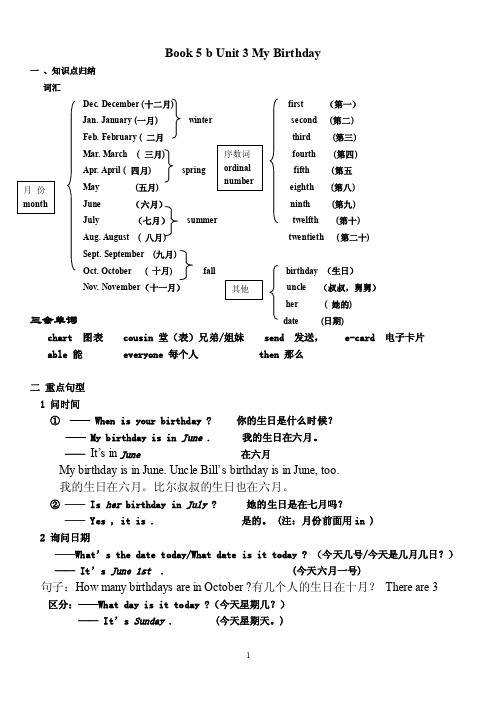
Book 5 b Unit 3 My Birthday 一、知识点归纳词汇Dec. December (十二月) first (第一)Jan. January (一月) winter second(第二)Feb. February ( 二月third (第三)Mar. March ( 三月) fourth (第四)Apr. April ( 四月) spring fifth (第五May (五月) eighth (第八)June (六月)ninth (第九)July (七月)summer twelfth (第十)Aug. August ( 八月) twentieth (第二十)Sept. September (九月)Oct. October ( 十月) fall birthday (生日)Nov. November(十一月)uncle (叔叔,舅舅)her ( 她的)三会单词date (日期)chart 图表 cousin 堂(表)兄弟/姐妹 send 发送, e-card 电子卡片able 能 everyone 每个人 then 那么二重点句型1 问时间①—— When is your birthday ? 你的生日是什么时候?—— My birthday is in June . 我的生日在六月。
——It’s in June 在六月My birthday is in June. Uncle Bill’s birthday is in June, too.我的生日在六月。
比尔叔叔的生日也在六月。
②—— Is her birthday in July ? 她的生日是在七月吗?—— Yes , it is . 是的。
(注:月份前面用in )2 询问日期——What’s the date today/What date is it today ? (今天几号/今天是几月几日?)—— It’s June 1st . (今天六月一号)句子:How many birthdays are in October ?有几个人的生日在十月?There are 3区分:——What day is it today ?(今天星期几?)—— It’s Sunday . (今天星期天。
人教版PEP小学英语五年级下册unit1至unit3知识点归纳

五年级下册Unit 1-3重点难点、单元单词、短语和知识点知识梳理第一单元知识点一、主要单词:do morning exercises晨练,做早操 eat breakfast吃早饭 have English class上英语课 play sports进行体育活动 eat dinner吃晚饭 eat lunch 吃午饭 climb mountains爬山 go shopping购物,买东西 play the piano 弹钢琴 visit grandparents看望(外)祖父母 go hiking去远足二、主要句子:When do you eat dinner你什么时候吃晚饭I eat dinner at 7:00 in the evening.我晚上七点吃晚饭。
When do you get up你什么时候起床I usually get up at 12:00 at noon.我通常在中午12点起床。
What do you do on the weekend你在周末干什么Usually I watch TV and go shopping.我通常看电视和购物。
Sometimes I visit my grandparents.有时候我去看望我的外祖父母。
I often play football.我经常踢足球。
Sometimes I go hiking.有时候我去远足。
三、同义词eat breakfast—have breakfast eat lunch—have luncheat dinner—have dinner play sports—do sports usually—often复数形式:policeman—policemen policewoman—policewomen现在分词:tell—telling三单:say—says同义句:What do you do ---What are you你是干什么的四、表示频度的副词:always总是,一直 usually通常,常常 often经常 sometimes有时候五、以复数形式出现的词组:visit grandparents plant trees介词后跟表示时间的词语时,表示在某年、某月、某个季节,某个时候(在上午,在下午,在晚上)用in;表示在某一天,在星期几用on,在具体的几点几分用at.七、too 和either的用法区别:too和either都是“也”的意思,但too用于肯定句,either用于否定句。
五年级下册英语第三单元
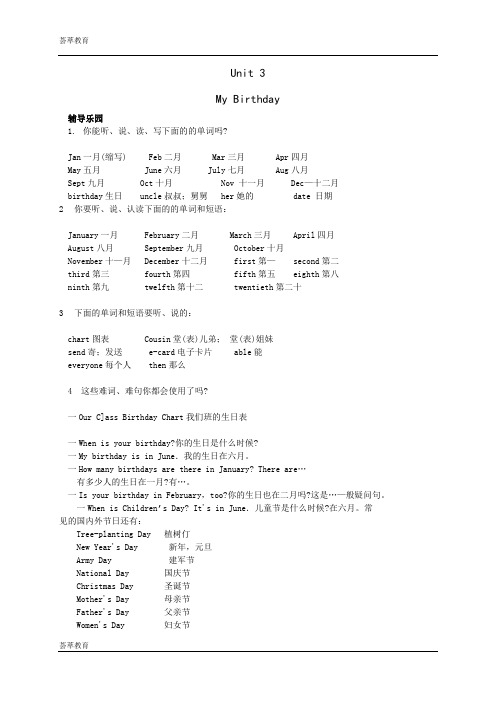
Unit 3My Birthday辅导乐园1.你能听、说、读、写下面的的单词吗?Jan一月(缩写) Feb二月 Mar三月 Apr四月May五月 June六月 July七月 Aug八月Sept九月 Oct十月 Nov 十一月 Dec—十二月birthday生日 uncle叔叔;舅舅 her她的 date 日期2你要听、说、认读下面的的单词和短语:January一月 February二月 March三月 April四月August八月 September九月 October十月November十—月 December十二月 first第— second第二third第三 fourth第四 fifth第五 eighth第八ninth第九 twelfth第十二 twentieth第二十3下面的单词和短语要听、说的:chart图表 Cousin堂(表)儿弟;堂(表)姐妹send寄;发送 e-card电子卡片 able能everyone每个人 then那么4 这些难词、难句你都会使用了吗?一Our C]ass Birthday Chart我们班的生日表一When is your birthday?你的生日是什么时候?一My birthday is in June.我的生日在六月。
一How many birthdays are there in January? There are…有多少人的生日在一月?有…。
一Is your birthday in February,too?你的生日也在二月吗?这是…—般疑问句。
一When is Children’s Day? It's in June.儿童节是什么时候?在六月。
常见的国内外节日还有:Tree-planting Day 植树仃New Year's Day 新年,元旦Army Day 建军节National Day 国庆节Christmas Day 圣诞节Mother's Day 母亲节Father's Day 父亲节Women's Day 妇女节Teachers’Day 教师节一What are you doing,John?约翰,你在干什么?一I am making a birthday chart for our family.我正在给我们家做一张生日表。
五年级英语第三单元重点句子

五年级英语第三单元重点句子一、单词(基础积累,有助于理解句子)1. 描述外貌特征的单词。
- young(年轻的;年少的)- old(老的;年纪大的)- funny(滑稽的;可笑的)- kind(体贴的;慈祥的;宽容的)- strict(要求严格的;严厉的)- polite(有礼貌的;客气的)- hard - working(工作努力的;辛勤的)- helpful(有用的;愿意帮忙的)- clever(聪明的;聪颖的)- shy(羞怯的;腼腆的)2. 其他相关单词。
- music(音乐)- art(美术)- science(科学)- English(英语)- maths(数学)- Chinese(语文;汉语)二、重点句子。
1. 描述人物性格或外貌的句子。
- He's young.(他很年轻。
)- She's old.(她年纪大了。
)- He is funny.(他很滑稽。
)- My mother is kind.(我的妈妈很慈祥。
)- Our teacher is strict.(我们的老师很严格。
)- The boy is polite.(这个男孩很有礼貌。
)- She is hard - working.(她学习/工作很努力。
)- He is helpful.(他很乐于助人。
)- My sister is clever.(我的姐姐很聪明。
)- The girl is shy.(这个女孩很害羞。
)2. 询问人物性格或外貌的句子。
- What's he like?(他是什么样的人?)- What's she like?(她是什么样的人?)3. 描述学科老师特点的句子。
- Our music teacher is young.(我们的音乐老师很年轻。
)- My art teacher is funny.(我的美术老师很滑稽。
)- His science teacher is strict.(他的科学老师很严格。
五年级英语下册第三单元重要词组汇总
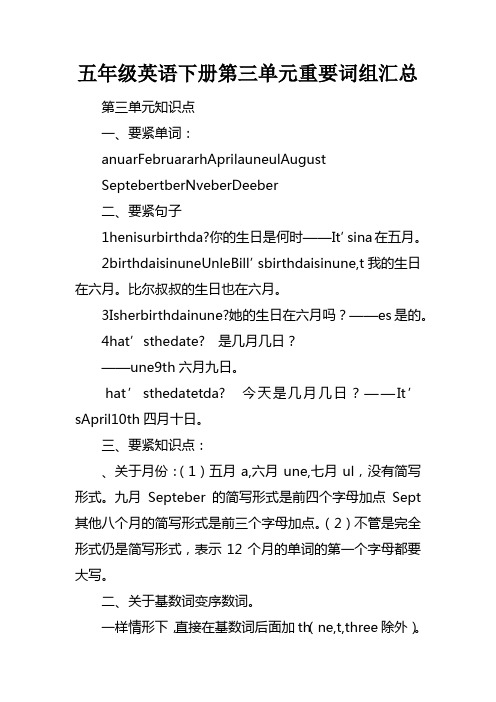
五年级英语下册第三单元重要词组汇总第三单元知识点一、要紧单词:anuarFebruararhAprilauneulAugustSeptebertberNveberDeeber二、要紧句子1henisurbirthda?你的生日是何时——It’sina在五月。
2birthdaisinuneUnleBill’sbirthdaisinune,t我的生日在六月。
比尔叔叔的生日也在六月。
3Isherbirthdainune?她的生日在六月吗?——es是的。
4hat’sthedate? 是几月几日?——une9th六月九日。
hat’sthedatetda?今天是几月几日?——It’sApril10th四月十日。
三、要紧知识点:、关于月份:(1)五月a,六月une,七月ul,没有简写形式。
九月Septeber的简写形式是前四个字母加点Sept 其他八个月的简写形式是前三个字母加点。
(2)不管是完全形式仍是简写形式,表示12个月的单词的第一个字母都要大写。
二、关于基数词变序数词。
一样情形下,直接在基数词后面加th(ne,t,three除外)。
ne—first,t—send,three—third以ve结尾的基数词,变ve为f,再加th如:five—fifth,telve—telfth以t结尾的基数词,直接加h。
如eight—eighth以不发音的字母e结尾的,丢掉不发音的字母e,再加th如nine—ninth以结尾的整十数,在变成序数词时,将变成ie再加th 如tent—tentieth20以上的两位数,变成序数词时,十位数不变,只将个位上的数变成序数词。
如:tent-ne----tent-first, tent-t—tent-send,thirt-fur—thirt-furth序数词的简写形式为表示该词的阿拉伯数字加上该单词的最后两个字母,最后两个字母要变成上标格式。
如:first —1st,send—2nd,third—3rd,furth—4thtentieth—20th 3在回答henisurbirthda?那个问题时,若是只说明生日在几月份,在月份前用in。
小学五年级下册英语单词及句型汇总(Unit 3)

小学五年级下册英语单词及句型汇总(Unit 3)单词汇总本文档是小学五年级下册英语单词及句型汇总的第三个单元。
以下是本单元的单词汇总:1.animal - 动物2.tiger - 老虎3.elephant - 大象4.monkey - 猴子5.panda - 熊猫6.kangaroo - 袋鼠7.giraffe - 长颈鹿8.zebra - 斑马9.lion - 狮子10.bear - 熊11.rabbit - 兔子12.squirrel - 松鼠13.insect - 昆虫14.butterfly - 蝴蝶15.bee - 蜜蜂16.ant - 蚂蚁17.grasshopper - 蚱蜢dybug - 瓢虫19.dragonfly - 蜻蜓20.sentence - 句子21.subject - 主语22.predicate - 谓语23.noun - 名词24.verb - 动词25.adjective - 形容词26.adverb - 副词27.pronoun - 代词28.question - 问题29.answer - 答案句型汇总在本单元中,我们学习了一些常用的句型。
以下是这些句型的汇总:1.My favorite animal is a tiger. - 我最喜欢的动物是老虎。
2.Elephants are big and strong. - 大象又大又强壮。
3.Monkeys are good at climbing trees. - 猴子擅长爬树。
4.Pandas are black and white. - 熊猫是黑白相间的。
5.Kangaroos can jump very high. - 袋鼠能够跳得很高。
6.Giraffes have long necks. - 长颈鹿有长脖子。
7.Zebras have black and white stripes. - 斑马有黑白相间的条纹。
五年级英语下册第三单元知识点汇总
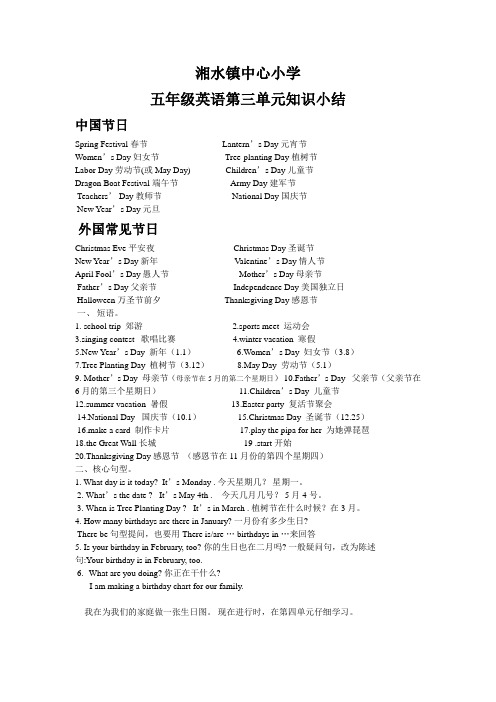
湘水镇中心小学五年级英语第三单元知识小结中国节日Spring Festival 春节 Lantern’s Day 元宵节Women’s Day 妇女节Tree-planting Day 植树节Labor Day 劳动节(或May Day) Children’s Day 儿童节Dragon Boat Festival 端午节 Army Day 建军节Teachers’ Day 教师节National Day 国庆节New Year’s Day 元旦外国常见节日Christmas Eve 平安夜Christmas Day 圣诞节New Year’s Day 新年 V alentine’s Day 情人节April Fool’s Day 愚人节Mother’s Day 母亲节Father’s Day 父亲节 Independence Day 美国独立日Halloween 万圣节前夕Thanksgiving Day 感恩节一、短语。
1. school trip 郊游2.sports meet 运动会3.singing contest 歌唱比赛4.winter vacation 寒假5.New Year’s Day 新年(1.1)6.Women’s Day 妇女节(3.8)7.Tree Planting Day 植树节(3.12) 8.May Day 劳动节(5.1)9. Mother’s Day 母亲节(母亲节在5月的第二个星期日) 10.Father’s Day 父亲节(父亲节在6月的第三个星期日)11.Children’s Day 儿童节12.summer vacation 暑假13.Easter party 复活节聚会14.National Day 国庆节(10.1) 15.Christmas Day 圣诞节(12.25)16.make a card 制作卡片 17.play the pipa for her 为她弹琵琶18.the Great Wall长城19 .start 开始20.Thanksgiving Day 感恩节(感恩节在11月份的第四个星期四)二、核心句型。
五年级下册英语三单元单词
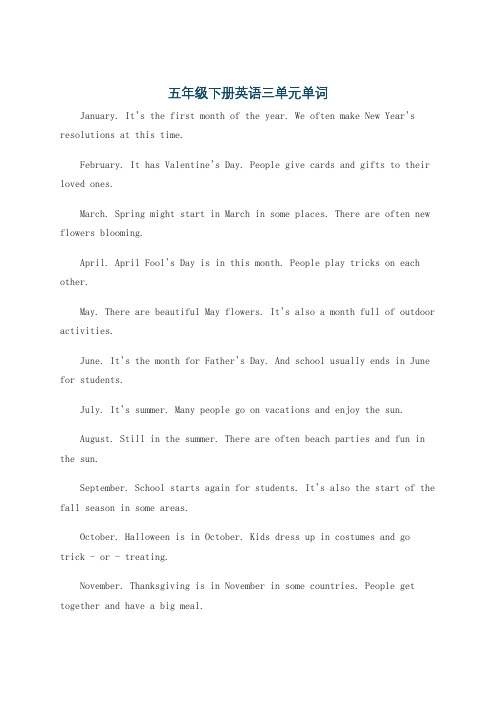
五年级下册英语三单元单词January. It's the first month of the year. We often make New Year's resolutions at this time.February. It has Valentine's Day. People give cards and gifts to their loved ones.March. Spring might start in March in some places. There are often new flowers blooming.April. April Fool's Day is in this month. People play tricks on each other.May. There are beautiful May flowers. It's also a month full of outdoor activities.June. It's the month for Father's Day. And school usually ends in June for students.July. It's summer. Many people go on vacations and enjoy the sun.August. Still in the summer. There are often beach parties and fun in the sun.September. School starts again for students. It's also the start of the fall season in some areas.October. Halloween is in October. Kids dress up in costumes and gotrick - or - treating.November. Thanksgiving is in November in some countries. People get together and have a big meal.December. Christmas is in December. It's a time for giving and getting presents and spending time with family.。
五年级下册英语第三单元单词,耕读

五年级下册英语第三单元单词,耕读Unit 3 Words in Grade Five (Part 2)In this unit, we will learn more new words in English. Let's start!1. Adventure (n): An exciting or unusual experience.Example: Going on a jungle trek was a real adventure for the children.2. Ancient (adj): Very old; belonging to a time long ago in history.Example: The ancient ruins of the castle are a popular tourist attraction.3. Civilized (adj): Polite, well-mannered, and respectful.Example: It is important to behave in a civilized manner when visiting other countries.4. Decline (v): To become weaker, smaller, or less.Example: The number of people using paper maps has declined since the introduction of GPS navigation.5. Diet (n): The food and drink that a person or animal usually consumes.Example: Eating a healthy diet is important for maintaining good health.6. Generation (n): All the people who were born at about the same time.Example: The younger generation is very interested in new technology.7. Transport (n): A system for carrying people or goods from one place to another, using vehicles.Example: Public transport in the city is very efficient and convenient.8. Adventure (n): An unusual, exciting, and possibly dangerous journey.Example: Some people enjoy going on adventures and exploring new places.9. Tax (n): Money that people have to pay to the government from their income.Example: It is important to pay your taxes on time to avoid any penalties.10. Culture (n): The customs, beliefs, arts, etc., of a particular society, group, place, or time.Example: The Chinese culture is rich in tradition and history.11. Democracy (n): A system of government in which power is held by the people, who either govern directly or through elected representatives.Example: The United States is a democracy where citizens can vote for their leaders.12. Exchange (v): To give something to someone and receive something in return.Example: Students from different countries often participate in exchange programs to learn about each other's cultures.13. Genuine (adj): Real and exactly what it appears to be.Example: The painting was a genuine masterpiece created by a famous artist.14. Illegal (adj): Against the law.Example: It is illegal to drive a car without a valid license.15. Illustration (n): A picture, diagram, or example that helps make something clear or attractive.Example: The book is full of colorful illustrations that help children understand the story better.16. Loan (n): Money that is borrowed, often from a bank.Example: She took out a loan to buy a new car.17. Precious (adj): Of great value; highly esteemed.Example: Family heirlooms are often very precious to their owners.18. Research (n): The detailed study of a subject, especially in order to discover new information or reach a new understanding.Example: Scientists are conducting research to find a cure for cancer.19. Sensible (adj): Based on or acting in accordance with good sense; reasonable.Example: It is sensible to save money for a rainy day.20. Unique (adj): Being the only one of its kind; unlike anything else.Example: Each snowflake is unique in its shape and design.These are the words in Unit 3 of Grade Five. Practice using them in sentences to improve your English vocabulary. Good luck!。
五年级下册第三单元的黑体单词造句,人教版

五年级下册第三单元的黑体单词造句,人教版1.—When is your birthday? 你的生日在什么时候?—My birthday is in June. 我的生日在六月。
2.How many birthdays are there in January?一月有多少个生日?3.What are you doing, John?约翰,你正在做什么?4.I am making a birthday chart for our fasmily.我正在为我们家制作一张生日图表。
5.There are three birthdays in June.在六月有三个生日。
6.Here’s the chart.这就是图表。
7.When is your Independence Day?你们的独立日在什么时候?8.Who has a birthday in October?谁的生日在十月?9.—What’s the date? 今天是几号?—It’s October 1st. 十月一日。
10.I am sending Grandma an e-card.我正在给祖母发一张电子卡片。
11.Does she have a computer?她有电脑吗?12.Then she won’t be able to see the card. 那她就不能看到生日卡片了。
13.Let’s make a birthday card.让我们制作一张生日卡片吧。
14.Everyone likes to get birthday cards.每个人都喜欢收到生日卡片。
15.I hear with my ear.我用我的耳朵听。
五年级下册第3单元单词英语
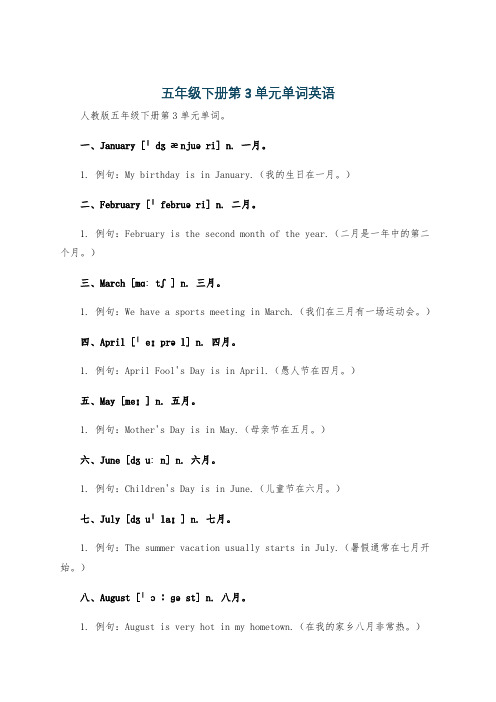
五年级下册第3单元单词英语人教版五年级下册第3单元单词。
一、January [ˈdʒænjuəri] n. 一月。
1. 例句:My birthday is in January.(我的生日在一月。
)二、February [ˈfebruəri] n. 二月。
1. 例句:February is the second month of the year.(二月是一年中的第二个月。
)三、March [mɑːtʃ] n. 三月。
1. 例句:We have a sports meeting in March.(我们在三月有一场运动会。
)四、April [ˈeɪprəl] n. 四月。
1. 例句:April Fool's Day is in April.(愚人节在四月。
)五、May [meɪ] n. 五月。
1. 例句:Mother's Day is in May.(母亲节在五月。
)六、June [dʒuːn] n. 六月。
1. 例句:Children's Day is in June.(儿童节在六月。
)七、July [dʒuˈlaɪ] n. 七月。
1. 例句:The summer vacation usually starts in July.(暑假通常在七月开始。
)八、August [ˈɔːɡəst] n. 八月。
1. 例句:August is very hot in my hometown.(在我的家乡八月非常热。
)九、September [sepˈtembə(r)] n. 九月。
1. 例句:We go back to school in September.(我们在九月返回学校。
)十、October [ɒkˈtəʊbə(r)] n. 十月。
1. 例句:National Day is in October.(国庆节在十月。
)十一、November [nəʊˈvembə(r)] n. 十一月。
五年级下册英语小报第三单元
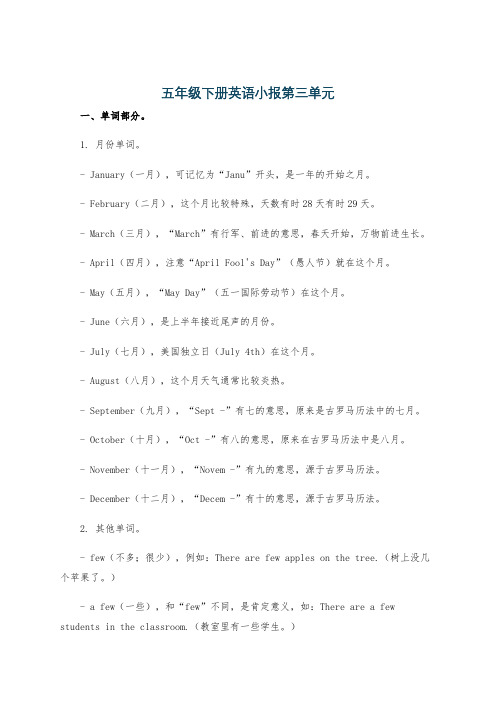
五年级下册英语小报第三单元一、单词部分。
1. 月份单词。
- January(一月),可记忆为“Janu”开头,是一年的开始之月。
- February(二月),这个月比较特殊,天数有时28天有时29天。
- March(三月),“March”有行军、前进的意思,春天开始,万物前进生长。
- April(四月),注意“April Fool's Day”(愚人节)就在这个月。
- May(五月),“May Day”(五一国际劳动节)在这个月。
- June(六月),是上半年接近尾声的月份。
- July(七月),美国独立日(July 4th)在这个月。
- August(八月),这个月天气通常比较炎热。
- September(九月),“Sept -”有七的意思,原来是古罗马历法中的七月。
- October(十月),“Oct -”有八的意思,原来在古罗马历法中是八月。
- November(十一月),“Novem -”有九的意思,源于古罗马历法。
- December(十二月),“Decem -”有十的意思,源于古罗马历法。
2. 其他单词。
- few(不多;很少),例如:There are few apples on the tree.(树上没几个苹果了。
)- a few(一些),和“few”不同,是肯定意义,如:There are a few students in the classroom.(教室里有一些学生。
)- thing(事情;东西),例如:This is a very interesting thing.(这是一件很有趣的事情。
)- meet(集会;开会),We will meet at the school hall.(我们将在学校礼堂开会。
)- sports meet(运动会),Our school sports meet is very exciting.(我们学校的运动会非常激动人心。
)- Easter(复活节),这是西方的一个重要节日,通常在春季。
五年级下册第三单元单词

英语五年级下册第三单元英语五年级下册第三单元单词总结一、动物类单词1.cat 猫2.dog 狗3.elephant 大象4.lion 狮子5.tiger 老虎6.bear 熊7.zebra 斑马8.monkey 猴子9.panda 熊猫10.koala 考拉二、颜色类单词1.red 红色2.blue 蓝色3.green 绿色4.yellow 黄色5.orange 橙色6.purple 紫色7.brown 棕色8.white 白色9.black 黑色10.pink 粉色三、食物类单词1.apple 苹果2.banana 香蕉3.pear 梨4.watermelon 西瓜5.grapes 葡萄6.peach 桃子7.tomato 西红柿8.potato 土豆9.onion 洋葱10.eggplant 茄子四、交通工具类单词1.car 小汽车2.bus 公共汽车3.train 火车4.ship 轮船5.plane 飞机6.bike 自行车7.scooter 小型滑板车8.motorcycle 摩托车9.subway 地铁10.ferry 渡船五、数字类单词1.one 一2.two 二3.three 三4.four 四5.five 五6.six 六7.seven 七8.eight 八9.nine 九10.ten 十六、天气类单词1.sunny 晴朗的2.rainy 下雨的/多雨的3.snowy 下雪的/多雪的4.windy 有风的5.cloudy 多云的/阴天的6.stormy 有暴风雨的/有雷阵雨的7.foggy 有雾的/多雾的8.hot 炎热的/温暖的/热情的/辣的/热的/热烈的/热烈欢迎的/热爱的/热心的/热衷的/热诚的/热切的/热潮/骚动的;紧张而热情的或感到闷热的音乐风格等,热力的等,如在7月西班牙举行的圣佩德罗节里或莱夫里岛的一种节奏明快而急促的音乐等。
在圣佩德罗节里,热歌名曲有《热切的何塞》等。
五年级下册英语第三单元词组

五年级下册英语第三单元词组五年级下册英语第三单元单词和词组美丽的beautiful 动物(an) animal同班同学classmate 兴趣hobby 硬币coin收集collect 邮票stamp 船ship拍照 take photos 去购物 go shopping集邮 collect stamps 集硬币collect coins种花 grow flowers 养金鱼 keep goldfish制作模型船 make model ships做衣服 make clothes 许多漂亮的邮票many beautiful stamps他的同班同学们his classmates 集中国邮票collect Chinese stamps 煮可口的食物cook nice food种漂亮的花 grow beautiful flowers做漂亮的连衣裙make pretty dresses做一件T恤衫make a T-shirt她的家人 her family天天 every day 浇树和花water the trees and flowers照看,照顾 look after同样的爱好 the same hobby五年级下册英语第三单元句子1. Do you have any hobbies? 你有些爱好吗?2. Yes I do. I like … ( taking photos) / No I dont. 是的,我有。
我喜欢(拍照)/ 不,我不喜欢。
3.He / She likes …( going shopping ).他 / 她喜欢。
(去购物)。
4.He / She doesnt like… ( growing flowers ).他 / 她不喜欢。
(种花)5.Bens hobby is collecting stamps.本的爱好是集邮。
五年级下册英语第三单元练习题听力测试部分一、听录音,选择你所听到的内容。
- 1、下载文档前请自行甄别文档内容的完整性,平台不提供额外的编辑、内容补充、找答案等附加服务。
- 2、"仅部分预览"的文档,不可在线预览部分如存在完整性等问题,可反馈申请退款(可完整预览的文档不适用该条件!)。
- 3、如文档侵犯您的权益,请联系客服反馈,我们会尽快为您处理(人工客服工作时间:9:00-18:30)。
五年级下英语单词句子
第三单元
1,一月
2,二月
3,三月
4,四月
5,五月
6,六月
7,七月
8,八月
9,九月
10,十月
11,十一月
12,十二月
13,不多;很少
14,一些
15,事情16,集会;开会17,运动会
18,旅行
19,年
20,种植
21,比赛;竞赛22,长城
23,国家的
24,国庆节
25,美国的
26,感恩节
27,圣诞节
28,游戏
29,迷;谜语30,扮演
31,把.....表演出来32,请赐复
33,在......之前34,中国35,鸡肉36,午餐37,老师38,绵羊39,鱼
40,短裤41,新鲜的42,便宜的43,短的44,衬衫45,好的46,做卡片47,给她写信48,弹琵琶49,寒假50,暑假
51,五月节
52,儿童节
53,植树节
54,中秋节
55,教师节
56,许愿
57,端午节
58,聚会什么时候举行?
59,在四月。
60,今年的(秋)游在什么时候。
61,在十月。
我们将去长城。
说明;一个单词1.5分计85.5分。
Talk A3’ B3’ C3’ D5.5’计14.5’。
